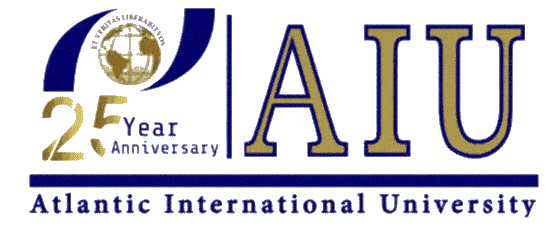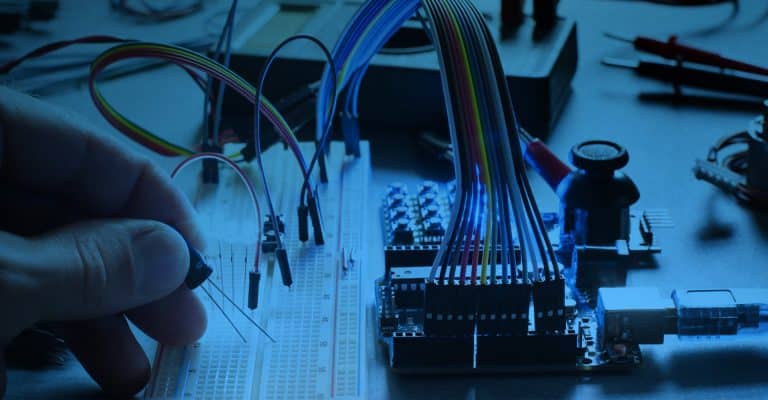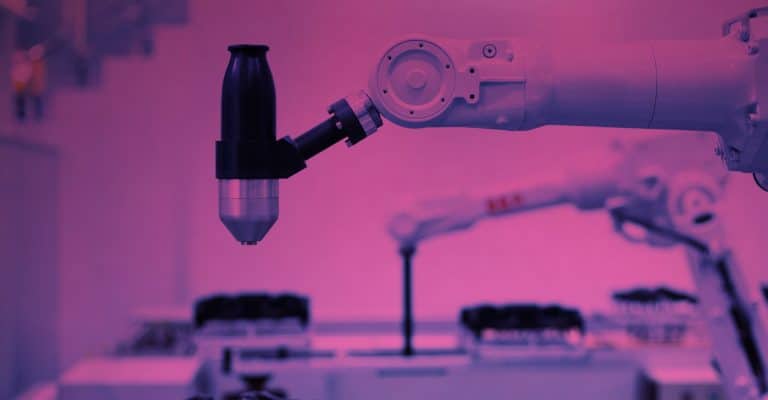Doctorate in Information Technology (D.Sc)
School of Science & Engineering
Academic Freedom to Discover Your Purpose
Open Curriculum Design at Atlantic International University
AIU’s Doctorate in Information Technology program is meticulously crafted to equip graduates with practical skills and profound theoretical knowledge to excel as leaders in their chosen fields. Our program aims to prepare Information Technology professionals for diverse career paths, including academia, counseling, and leadership positions, by offering a comprehensive curriculum that combines specialized expertise with cutting-edge research.
At AIU, we understand that every student is unique. That’s why our distance learning Doctorate program in Information Technology is entirely customizable. With the guidance of your advisor, you’ll curate a program specifically tailored to match your career aspirations and personal interests. Unlike traditional programs, we offer you the flexibility to shape your learning journey.
Our program isn’t just about studying predetermined subjects or using standardized materials. It’s about empowering you to become an authority in multiple critical areas of computer science. You’ll develop a distinctive foundation of practical knowledge and a deep understanding of computer science theory through rigorous study and research, enabling you to contribute significantly to the field.
A Doctorate in Information Technology represents a profound testament to one’s expertise within the field, serving as a pivotal gateway to significantly impacting the landscape of Information Technology. It serves as a platform to make enduring contributions to the comprehension of language and its intricate complexities.
This distinctive program is meticulously crafted to foster research within specific areas of interest, thereby enhancing the knowledge and proficiencies of seasoned professionals specializing in legal studies. AIU’s Doctorate in Information Technology distinguishes itself by offering a holistic curriculum that integrates diverse facets of computer science, seamlessly blending practical application with profound theoretical insights.
What sets AIU apart is the inherent flexibility woven into our Distance Learning Doctorate program. Steering away from standardized approaches, AIU eschews a uniform model. Instead, we collaborate closely with you and your advisor to fashion a bespoke curriculum tailored precisely to align with your career aspirations and personal objectives. This personalized methodology ensures that your educational journey is finely attuned to your unique requirements, propelling you toward success in your chosen field.
Courses and Topics in Doctorate in Information Technology
The Doctor of Information Technology (D.Sc) program at AIU is tailored to empower students with both practical skills and theoretical expertise essential to excel as leading professionals in the dynamic realm of technology.
The core goal of our program is to prepare Information Technology graduates for diverse career paths in academia, counseling, or influential leadership roles within their specialized fields. We aim to advance the professional development of experienced IT graduates and professionals, equipping them with a broad spectrum of research and process-driven IT skills. Through this, they become catalysts, making significant leadership contributions in their chosen sectors.
At AIU, our Doctorate in Information Technology transcends the ordinary. Our curriculum delves deep into various critical areas of computer science, cultivating a unique blend of practical knowledge and robust theoretical foundations. Students have the freedom to explore multiple domains.
Our commitment to tailoring your learning journey according to your aspirations and professional goals sets AIU apart. Students are all unique, and their educational paths should be different. Collaborate closely with your advisor to craft a personalized curriculum. Our distance learning format provides the flexibility rarely found in traditional programs, allowing you to shape your academic journey according to your unique interests and ambitions.
- Software Systems Design and Implementation
- Algorithms and Data Structures
- Data Warehousing
- Technical Foundations
- Information Systems Research
- Multivariate Modeling
- Object-Oriented Systems
- Information Technology Delivery
- Strategy and Management of Information Technology
- Statistical Research Techniques
- Qualitative Research
- Research Methodology
Orientation Courses
Welcome to the Orientation Courses for the Doctor of Information Technology (D.Sc) program at AIU, where our primary goal is to empower students with a comprehensive blend of practical skills and theoretical knowledge essential to excel as experts in their respective fields. Our program is meticulously crafted to equip Information Technology graduates with the prowess to venture into academia, counseling, or leadership roles aligned with their specialized areas of study.
- Communication & Investigation (Comprehensive Resume)
- Organization Theory (Portfolio)
- Experiential Learning (Autobiography)
- Academic Evaluation (Questionnaire)
- Fundament of Knowledge (Integration Chart)
- Fundamental Principles I (Philosophy of Education)
- Professional Evaluation (Self Evaluation Matrix)
- Development of Graduate Study (Guarantee of an Academic Degree)
Research Projects in Doctorate in Information Technology
In our Doctorate in Information Technology, research projects are gateways to pioneering advancements in the digital realm. Our program fosters a dynamic environment where scholars explore cutting-edge themes, from artificial intelligence and machine learning to cybersecurity and blockchain innovation. Embracing interdisciplinary approaches, our students delve into projects that redefine technological paradigms, addressing societal challenges and industry needs. Imagine crafting algorithms that revolutionize data analysis or pioneering encryption methods to safeguard information integrity.
Our doctoral candidates harness the latest tools and methodologies, propelling their research toward impactful solutions. Join us in pursuing groundbreaking discoveries that shape the future of technology, leveraging your expertise to impact the world.
- Doctoral Dissertation Project
- MBM900 Doctoral Proposal
- MBM902 Doctoral Dissertation (15,000 words)
Publication – As students explore research methodologies, data assessment, and interpreting results, they cultivate essential skills in critical thinking and analysis. These abilities enable proficient evaluation and understanding of information.
Embrace Futuristic Opportunities with a Doctorate in Information Technology from AIU and Shape the Digital Landscape with Miracle.
Check Out the Live Classes
Transformative Doctorate Student Journey at AIU
In a world pulsating with data-driven possibilities, the journey toward a Doctorate in Information Technology is a metamorphosis waiting to unfold. The journey begins with an insatiable curiosity, from the initial plunge into research methodologies to the exploration of complex algorithms. It’s transitioning from a passive observer to an active pioneer, navigating the seas of data and delving into AI, cybersecurity, and beyond.
Each milestone in this odyssey marks a transformative phase. The scholar evolves, not just in knowledge but in mindset. It’s a transition from consuming information to generating knowledge, from solving problems to envisioning innovations that redefine the technological landscape.
The Doctorate in Information Technology is an expedition into uncharted territories. It’s about peering beyond the horizon, diving deep into specialized domains, and discovering connections where they need to be made apparent. The blend of theoretical exploration and hands-on experimentation becomes the compass guiding this academic voyage. It’s not just about mastery of technology; it’s about the ability to lead and inspire change. This journey nurtures visionary leaders who steer the course of technological evolution, influencing industries and societies and shaping the future.
The Doctorate in Information Technology is not just about the present; it’s a preparation for the future. It’s a commitment to constant learning, adaptability, and staying ahead of the curve in an ever-evolving landscape. It’s about being the catalyst for the next paradigm shift.
As the dissertation culminates and graduation looms on the horizon, the student emerges not just as a Doctor in Information Technology but as a torchbearer of innovation, equipped to transform challenges into opportunities and contribute to a world reshaped by technology.
Community & Social
AIU’s online program nurtures a dynamic and closely-knit community with utmost attention. We harness state-of-the-art technologies and collaborative tools to ensure your learning experience is far from isolated. Our Virtual Campus Mobile App, alongside platforms like MYAIU, AIULink, and AIUTV, serves as a digital bridge, fostering connections among students, alumni, and faculty members on a global scale.
The Doctorate in Information Technology at AIU transcends mere academia; it’s a transformative odyssey. It embodies an exploration of knowledge, innovation, and leadership, empowering students to carve a path toward a more promising and equitable future, not just for themselves but also for the sphere of education and beyond. It’s a journey that leads to a future where concepts materialize, and obstacles are met with ingenious resolutions.
Contact Us Today!
We understand how busy adults do not have time to go back to school. Now, it’s possible to earn your degree in the comfort of your own home and still have time for yourself and your family. The Admissions office is here to help you, for additional information or to see if you qualify for admissions please contact us. If you are ready to apply please submit your Online Application and paste your resume and any additional comments/questions in the area provided.
Pioneer Plaza
900 Fort Street Mall 905
Honolulu, HI 96813
800-993-0066 (Toll Free in US)
808-924-9567 (Internationally)
808-947-2488 (Fax)
Academic Resources
The AIU Virtual Campus stands as a pioneering center, offering a diverse suite of over 25 meticulously designed tools that empower students in their academic and personal pursuits. Our unwavering commitment to cutting-edge technology is exemplified by the revolutionary Virtual Reality 3D immersive experience, fostering a dynamic community environment that significantly enhances student development, motivation, and creativity.
Central to our academic arsenal are easily accessible resources. This encompasses an online library housing an extensive collection of over 260,000 books and 30 million peer-reviewed articles, journals, and publications. This invaluable repository is complemented by a comprehensive database comprising more than 105,000 academic resources thoughtfully curated by the thriving AIU community.
For those embarking on a Doctorate in Information Technology or any related doctoral program, these resources serve as a vital foundation for your growth and success. Tailored to a wide spectrum of academic interests, each resource is meticulously personalized to meet our students’ distinct needs and aspirations, ensuring they possess the essential tools to transform their aspirations into tangible accomplishments and fulfill their program objectives.
Virtual Campus
Complete assignments online or offline at your convenience with 24/7 access to distance learning through AIU’s Virtual Campus. Step by Step guides including videos, tutorials, live webinars and examples for each course. All materials can be access on all web browsers as well as via AIU's Mobile App which brings all the features of the Virtual Camus to your Mobile Device.
My AIU Elements
MyAIU’s primary goal is to go beyond Academics, it looks to guide students through 11 elements that are key to living life optimally in all aspects. By identifying and reflecting on these key areas, an opportunity arises to holistically address them, through positive change, habits, reinforcement and tools to keep students on their chosen path.
AIU TV & Radio
The students have the opportunity to produce, edit and host their own show reaching a worldwide audience, the AIU community and giving notice of their expertise/passion in the subject. AIUTV & AIU Radio allow students to explore new ways to communicate, develop a platform and form potential collaboration with likeminded individuals.
AIU Campus Mundi
AIU Campus Mundi is a monthly magazine that gathers the most notable news and information about the university and its members in one convenient place. The magazine allows our community to be well informed, involved and keep in tough regardless of their geographic location. AIU Campus Mundi publishes, news, research, events, awards, academic achievements.
Graduation Ceremony
Each year AIU organizes graduation ceremonies where the students can assist and share their experiences with fellow students and academic members Participation in the ceremony is optional, the day’s events include conferences, research presentations, group meetings, networking, lunch and formal dinner.
Symposiums & Webinars
Our symposiums cultivate intellectual conversations and collaboration, creating a dynamic atmosphere where students, faculty, and industry experts convene, exchange ideas, and form enduring connections. Within this environment, pioneering research seamlessly intersects with practical applications, and theories undergo rigorous examination, improvement, and redefinition through the collective wisdom of the academic community.
Live Classes
AIU’s Doctorate in Information Technology program revolutionizes the landscape of online education. We take pride in delivering vibrant, interactive classes that inject vitality into the virtual classroom, fostering a fully immersive and dynamic learning atmosphere for our students. Guided by our seasoned faculty and industry leaders, these real-time sessions offer a priceless platform for immediate discussions, extensive Q&A sessions, and collaborative problem-solving endeavors.
Participating in these live classes not only enriches your grasp of intricate strategic leadership concepts but also cultivates meaningful connections among peers, forging a robust sense of community. Enrolling in AIU’s live courses opens doors to engaging in intellectually stimulating conversations, staying abreast of the latest trends and innovations in the field, and receiving timely, personalized feedback from instructors.
This innovative approach to online learning ensures that your academic journey in the Doctorate in Information Technology, whether pursuing a Ph.D. in linguistics or a related discipline, transcends traditional education. It offers a profoundly enriching experience tailored precisely to your individual needs and aspirations.
Special Projects
At AIU, our Doctorate in Information Technology program champions innovative thinking, going beyond traditional academia to provide a dynamic journey. We integrate hands-on projects seamlessly into our robust academic curriculum, enriching the experience with practical applications. These projects reflect our dedication to nurturing holistic leadership development, bridging the gap between theoretical learning and real-world implementation.
Within our Doctor of Information Technology program, these distinct projects often involve exciting collaborations with seasoned industry professionals and esteemed thought leaders. This collaborative environment not only equips our students with invaluable expertise but also keeps them abreast of the latest industry advancements and leadership best practices.
Break Free from the Don’ts and Do the Right Thing, Be an Active Part of the Change Information Technology is About to Bring – Complete your Doctorate from AIU Today!
Apply for Admission
Career Center
The Career Center introduces an enticing and enriching pathway, brimming with abundant opportunities spanning diverse industries and fields. AIU’s Doctorate in Information Technology empowers students with advanced expertise, exceptional research skills, and astute leadership qualities, equipping them for influential roles in academia, industry, and policy formulation. Through rigorous coursework, dedicated research initiatives, and exposure to a global perspective, graduates emerge as trailblazers driving technological progress and addressing intricate challenges.
For individuals seeking the flexibility of online education, the center offers a route to pursue advanced studies, liberating learners from the confines of a traditional classroom setup. These programs are meticulously crafted to accommodate the demanding schedules of working professionals, enabling them to elevate their education while adeptly managing work commitments and other responsibilities.
Job Opportunities
After completing a Doctorate in Information Technology, individuals can pursue various career paths in multiple sectors due to their advanced expertise and specialized knowledge. Here are some potential job descriptions and roles that someone with a Doctorate in Information Technology might explore:
- Chief Technology Officer (CTO): As a CTO, you’d be responsible for overseeing the technological aspects of an organization. This role involves strategic planning, innovation, and ensuring the company’s technology initiatives align with its business goals.
- Research Scientist: Work in research-focused roles, either in academia or industry, conducting advanced research in areas such as artificial intelligence, cybersecurity, data analytics, or emerging technologies. This might involve developing new algorithms, exploring novel technologies, or advancing the theoretical foundations of IT.
- University Professor/Researcher: Pursue a career in academia as a professor or researcher, teaching and mentoring students while conducting research in specialized IT fields. This role involves publishing papers, securing research grants, and contributing to the academic community’s knowledge base.
- Data Scientist/Analyst: Apply advanced statistical and computational techniques to analyze complex data sets, derive insights, and make data-driven decisions. Data scientists use their expertise to solve business problems, improve processes, and drive innovation.
- Cybersecurity Consultant/Expert: Specializes in safeguarding systems and networks against cyber threats. Design and implement robust security measures, conduct risk assessments, and develop strategies to protect sensitive data and infrastructure.
- Information Technology Manager/Director: Oversee IT operations within an organization, managing teams, implementing technology strategies, and ensuring systems and networks operate efficiently and securely.
- Technology Entrepreneur: Start your own tech-focused business or venture, leveraging your expertise to innovate and create solutions for industry challenges. This might involve developing software, launching a tech startup, or offering consultancy services.
- Senior Research and Development (R&D) Engineer: Engage in the development and testing of new technologies, products, or systems within industries like telecommunications, software development, or electronics.
- IT Policy Analyst: Work with governments, regulatory bodies, or international organizations to shape IT policies and regulations. This role involves analyzing the impact of technology on society, addressing ethical concerns, and ensuring compliance with laws and standards.
- Innovations Director: Lead innovation initiatives within organizations, identify opportunities for technological advancements, and drive projects leveraging emerging technologies to gain a competitive edge.
A Doctorate in Information Technology equips individuals with expertise, allowing them to choose diverse career paths as per their interests, skills, and the evolving landscape of technology and innovation.
Employment Opportunities after Completing Doctorate in Information Technology
- Academia and Research: With a doctorate, you can pursue a career in academia as a professor, lecturer, or researcher in universities and research institutions. You might lead research projects, publish papers, and contribute to advancements in IT.
- Chief Technology Officer (CTO): Doctorate holders often qualify for executive roles like CTO, where they provide strategic direction for technology initiatives within companies, oversee technological advancements, and lead innovation efforts.
- Information Systems Manager: These professionals oversee IT departments, ensuring smooth operations, implementing new technologies, and managing teams to maintain and enhance an organization’s technology infrastructure.
- Data Scientist or Analyst: Doctorate holders in IT might work as data scientists or analysts, leveraging advanced analytical skills to extract insights from complex datasets, contributing to data-driven decision-making.
- Cybersecurity Expert: There’s a growing demand for experts in cybersecurity. Doctorate holders can specialize in this field, developing and implementing security protocols, protecting systems, and combating cyber threats.
- Consultant or Advisor: Many organizations seek doctoral-level expertise to provide strategic advice on technological advancements, innovation, and digital transformation strategies.
- Entrepreneurship: Doctorate holders might opt to start their ventures, launching tech startups or consultancy firms based on their specialized knowledge and research.
- Government and Nonprofit Sectors: Opportunities exist in government agencies or nonprofit organizations where IT expertise is required for policy-making, data management, or implementing technology-driven initiatives.
- Healthcare Informatics: With the evolution of digital health records and healthcare technologies, there are opportunities to apply IT expertise in healthcare settings as informatics specialists or consultants.
- Artificial Intelligence and Machine Learning Specialist: Doctorate holders with expertise in AI and machine learning are sought after in industries exploring automation, predictive analytics, and AI-driven innovations.
Tools used in Information Technology
Here’s a list of some software tools commonly used in Information Technology.
- Microsoft Azure – Cloud computing platform
- Amazon Web Services (AWS) – Cloud services platform
- Google Cloud Platform (GCP) – Cloud computing services
- VMware – Virtualization and cloud computing software
- Docker – Containerization platform
- Ansible – Automation tool for IT infrastructure
- Git – Version control system
- Jira – Project management and issue tracking software
- Splunk – Data analysis and monitoring platform
- Wireshark – Network protocol analyzer
- Elasticsearch – Distributed search and analytics engine
- Microsoft SQL Server – Relational database management system
- Oracle Database – Database management system
- Nagios – Monitoring and alerting system
Associations for Professionals in Information Technology
Here’s a list of notable professional associations related to Information Technology. These associations cater to various aspects of Information Technology, including networking, cybersecurity, data management, certifications, and more. Each offers unique benefits and resources to professionals in the field.
- Association for Computing Machinery (ACM): ACM is one of the largest and most prestigious global computing societies, providing resources, publications, conferences, and networking opportunities for IT professionals.
- Institute of Electrical and Electronics Engineers Computer Society (IEEE-CS): IEEE-CS is a leading professional organization dedicated to advancing the theory, practice, and application of computer and information processing science and technology.
- Information Systems Security Association (ISSA): ISSA is a community of cybersecurity professionals offering education, networking, and resources to enhance knowledge and skills in IT security.
- International Association of Computer Science and Information Technology (IACSIT): IACSIT is an international organization promoting research and development in computer science and information technology through conferences, publications, and collaborations.
- Information Technology Industry Council (ITI): ITI advocates for the technology industry at the global level, working on policy issues and fostering innovation in the IT sector.
- Data Management Association International (DAMA International): DAMA International focuses on data management practices and offers resources, education, and networking opportunities for data professionals.
AIU’s Doctorate in Information Technology Program Transforms Mind and Shapes the Future of Innovation.
Did You See Our Virtual Campus?
Requirements for Doctorate in Information Technology
A Doctorate in Information Technology typically requires a master’s degree in a related field, such as IT, computer science, or engineering. Applicants must often demonstrate proficiency in research methods, possess vital academic records, and submit GRE scores, letters of recommendation, an SOP, and sometimes a sample of scholarly writing. The program involves advanced coursework, original research, and a dissertation and may entail specializations in cybersecurity, data science, or network systems. Additionally, participation in academic conferences and publishing of research papers may be expected for the successful completion of the program.
How Can You Apply?
The pursuit of a Doctorate in Information Technology involves a series of steps. Here’s a comprehensive guide to help navigate through this process:
- Research Programs: Investigate various universities and institutions offering Ph.D. programs in Information Technology. Consider elements like faculty expertise, research prospects, and program prestige.
- Review Admission Criteria: Examine the detailed admission prerequisites for each program. These might encompass academic transcripts, recommendation letters, a well-articulated statement of purpose (SOP), and standardized test scores like the GRE.
- Compile Application Materials: Collect essential documents, including transcripts, recommendation letters, a carefully crafted statement of purpose delineating your research interests and objectives, and any mandatory standardized test scores.
- Connect with Potential Mentors: Initiate contact with prospective advisors or mentors within the program. Early engagement can enhance your application and establish rapport.
- Complete Standardized Tests (if necessary): Certain programs, such as the GRE, might mandate standardized test scores. Verify the specific requirements of your chosen programs.
- Submit Your Application: Adhere to the guidelines outlined in the application process provided by the university or institution. Typically, applications are submitted online via the institution’s admissions platform.
- Fulfill Application Fees: Be ready to cover any associated application fees.
- Participate in Interviews (if requested): Some programs may require an interview as part of the selection process. Prepare by revisiting your research interests and acquainting yourself with the program.
- Await Admission Decisions: Following submission, exercise patience while awaiting admission decisions. The duration of this process varies across institutions.
- Explore Financial Support: Investigate financial aid avenues such as scholarships, grants, or assistantships to fund your doctoral studies.
Keep in mind that each university may have distinct requirements and deadlines. Hence, it’s vital to meticulously review the information provided by the institutions of interest. Furthermore, if you encounter any queries or uncertainties during the application process, don’t hesitate to reach out to the admissions office for clarification and assistance.
Financial Support & Scholarships
We’re excited to announce a selection of scholarships designed specifically for our doctoral candidates. We invite you to provide your information, opening doors to a multitude of grants that can enrich your academic and intellectual endeavors. Come along on this educational path and turn your academic dreams into tangible accomplishments.
How Much Does a Doctorate in Information Technology Cost Per Year?
We recognize the significance of financial flexibility in your educational endeavors. Hence, depending upon the type of program you choose, we have introduced a convenient monthly payment plan to make your pursuit of a doctorate manageable and free from financial worries. Our exceptionally affordable tuition fee covers the expense for Doctorate in Information Technology. So, secure your future with AIU, where first-rate education aligns perfectly with your budget. Your aspirations are well within your grasp.
FAQs
Q. What are the admission requirements for a Doctorate in Information Technology?
Ans: Admission requirements for a Doctorate in Information Technology (IT) can vary based on the specific university or institution offering the program. However, here are typical admission criteria commonly found in such programs:
- Educational Background: A master’s degree in a related field is advantageous. Some programs may accept applicants with a bachelor’s degree if they possess exceptional qualifications or relevant work experience.
- Minimum GPA: Most programs require a minimum grade point average (GPA) for previous academic coursework, often around 3.0 on a 4.0 scale. Some institutions may consider applicants with a slightly lower GPA if they demonstrate strong qualifications in other areas.
- Professional Experience: Some doctoral programs prefer candidates with relevant professional experience in the IT field. This experience might vary but typically ranges from a few years to substantial work in IT or related sectors.
- Letters of Recommendation: Applicants must usually submit recommendation letters from academic or professional sources attesting to their qualifications, skills, and potential for success in a doctoral program.
- Statement of Purpose or Personal Statement: A well-written report detailing the applicant’s reasons for pursuing a doctorate in IT, their research interests, career goals, and how the program aligns with their aspirations is commonly required.
- Resume/CV: A comprehensive resume or curriculum vitae (CV) outlining the applicant’s educational background, work experience, research involvement, publications, and any relevant achievements.
- Standardized Test Scores: Some institutions may require GRE (Graduate Record Examination) scores, while others might waive this requirement, especially for applicants with substantial professional experience or exceptional academic qualifications.
- Interviews: In some cases, applicants might be invited for an interview, either in person or virtually, to discuss their background, research interests, and potential fit for the program.
- Writing Samples or Research Proposals: Some programs may request writing samples or research proposals showcasing the applicant’s academic writing ability and potential research interests.
Prospective students should thoroughly check the program’s website or contact the admissions office for detailed and accurate information regarding admission requirements.
Q. How long does it typically take to complete a Doctorate in Information Technology?
Ans: The duration of a Doctorate in Information Technology can vary depending on the specific program structure, the student’s enrollment status (full-time or part-time), the individual’s pace of progress, and the dissertation or research project requirements.
Some programs offer structured coursework, followed by a comprehensive exam and dissertation research. Others may have a more flexible structure focusing on independent research from the outset. The time to complete coursework, comprehensive exams, and research can affect the overall duration.
Again, a significant portion of the doctoral program is dedicated to conducting research and completing a dissertation. The time taken to develop and defend the dissertation varies based on the complexity of the study, data collection, analysis, and writing. This stage often influences the overall duration significantly.
Also, full-time students might complete their programs more quickly than part-time students, who often balance their doctoral studies with other commitments like work or family.
Q. What types of research areas or specializations are available in Information Technology doctoral programs?
Ans: Doctoral programs in Information Technology offer diverse research areas and specializations that cater to the evolving landscape of technology and its applications. Some common research areas and fields include:
- Cybersecurity and Information Assurance: Focuses on securing digital information, protecting systems, networks, and data from cyber threats, and developing secure computing practices.
- Data Science and Big Data Analytics: Involves the study of methods, tools, and techniques to analyze and derive insights from large datasets, emphasizing data mining, machine learning, and predictive analytics.
- Artificial Intelligence and Machine Learning: Explores algorithm models, makes decisions, and performs tasks without explicit programming.
- Computer Networks and Communications: Covers network design, protocols, wireless communications, internet technologies, and emerging network architectures.
- Information Systems Management: Focuses on the strategic use of technology in organizations, including IT governance, project management, enterprise architecture, and IT leadership.
- Human-Computer Interaction (HCI) and User Experience (UX): Examines the design, usability, and interaction between humans and computers, emphasizing user-centered design principles.
- Software Engineering and Development: Explores methodologies, processes, and tools for developing high-quality software systems, including software testing, verification, and maintenance.
- Health Informatics: Integrates IT into healthcare systems to improve patient care, data management, electronic health records, telemedicine, and healthcare analytics.
- Internet of Things (IoT) and Embedded Systems: Focuses on interconnected devices, sensor networks, and embedded systems, exploring their applications in various domains.
- Cloud Computing and Virtualization: Involves the study of cloud technologies, distributed systems, virtualization, and related security and scalability issues.
- Information Technology Ethics and Policy: Examines ethical, legal, and social implications of technology, including privacy, data protection, intellectual property, and digital rights.
- Computer Vision and Image Processing: Focuses on algorithms and techniques for analyzing, interpreting, and understanding visual data.
AIU allows students to tailor their research to interdisciplinary areas or emerging technologies based on their interests and career goals. As technology continues to evolve, new research areas within IT constantly appear, providing opportunities for innovative research and specialization.
Q. Are there any online or part-time Doctorate programs in Information Technology?
Ans: Yes, AIU offers online Doctorate programs in Information Technology. AIU’s programs are carefully designed to offer flexibility to working professionals, allowing remote study and accommodating diverse schedules while maintaining the rigor of a traditional doctoral program.
Q. What is the typical coursework like in a Doctorate in Information Technology program?
Ans: Coursework in a Doctorate in Information Technology program often covers advanced topics in IT research methodologies, computer science theory, and specialized areas like cybersecurity, data analytics, AI, networking, and software engineering. Students might engage in seminars, research methodology courses, electives in their chosen specialization, and comprehensive exams before starting their dissertation research.
Q. What kind of dissertation or thesis projects are expected in a Doctorate in Information Technology?
Ans: Doctoral dissertations in Information Technology often involve original research, addressing a significant problem or gap in the field. Projects might include developing new algorithms, creating innovative software, conducting empirical studies, analyzing large datasets, designing systems, or proposing frameworks/models. Research topics can range from cybersecurity solutions to AI applications, data analytics methodologies, network optimization, and beyond, showcasing advanced expertise and contributing new knowledge to the field.
Contact Us
Atlantic International University
900 Fort Street Mall 905 Honolulu, HI 96813
Quick Links
Home | Spanish | Online Courses | Available Courses | Vrtual Campus | Career Center | Available Positions | Ask Career Coach | The Job Interview | Resume Writing | Accreditation | Areas of Study | Bachelor Degree Programs | Masters Degree Programs | Doctoral Degree Programs | Course & Curriculum | Human Rights | Online Library | Representations | Student Publication | Sponsors | General Information | Mission & Vision | School of Business and Economics | School of Science and Engineering | School of Social an Human Studies | Media Center | Admission Requirements | Apply Online | Tuition | Faculty & Staff | Distance Learning Overview | Student Testimonials | Frequently Asked Questions | Register for Program | Privacy Policy | FAQ



























